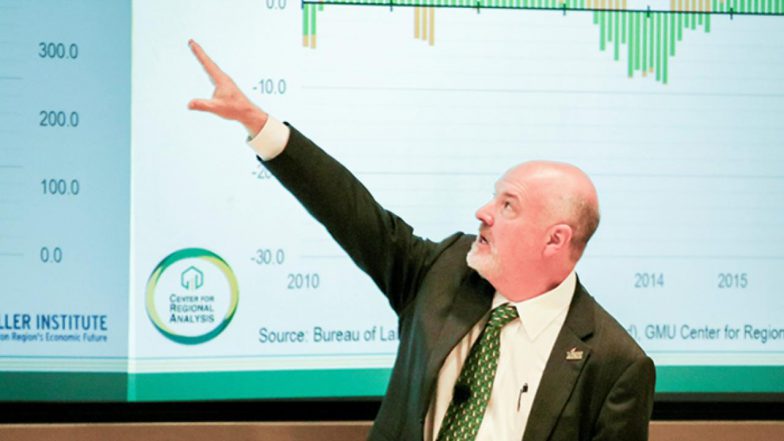Summary
Mission
The principal mission of the Center for Regional Analysis (CRA) is to provide research and technical assistance to local government and businesses, primarily located in the Washington DC Metro region. These efforts focus on economic, demographic, transportation, housing and fiscal issues.
To execute this mission, the Center’s staff conducts regular research on the performance of the Washington area economy, issues regular reports on the region’s economy, housing, and demographic conditions, and participates in local meetings and conferences sponsored by governments, non-profit organizations, chambers of commerce and like organizations.
The Center for Regional Analysis is the “go to” organization for economic, demographic and housing data and analysis within the Washington and Baltimore regions and is cited locally and nationally as the source of information for the media, research scholars, and investors interested in understanding the Washington area‘s economy.
The Center posts reports, presentations, data and other information its website (cra.gmu.edu). This readily available research and analysis, and the Center’s location within George Mason University, have made CRA the primary source of public information about the region.
Terry Clower, is Director of the Center for Regional Analysis, Schar School of Policy and Government
OnAir Post: CRA – Center for Regional Analysis
About
History
The Center for Regional Analysis was formed in 1993 to undertake research on regional economic development policy focusing primarily on technologically intense regions. While some of its work initially focused on regional development policy in Europe and Asia as well as North America, much of its activity is concentrated on its immediate laboratory, the Washington DC region.
One of the Center’s first major initiatives was a conference on the future of the Northern Virginia Economy, held in May of 1994. The conference chronicled the recent development history of the Northern Virginia region including an analysis of its technology sector, which for the first time recognized that technology is the economic base of the region. The conference also unveiled the Center’s econometric input-output model of the regional economy, which was used to forecast different future economic scenarios. The initial work of the Center focused on examining the role of leadership in regional economic development. A theoretical approach was developed and tested in 1993 served as the theoretical rationale for the development of the Northern Virginia Business Roundtable. The Roundtable is a collection of some 100 CEOs from Northern Virginia businesses charged with developing intermediate and long range strategies for the region’s future. The Center has provided staff support for this initiative in areas such as industry targeting capital formation, higher education, elementary and secondary education, transportation and leadership development.
The Center, on the basis of earlier work on technology in the region for the Northern Virginia Technology Council and the Virginia Center for Innovative Technology, undertook the development of a technology database for the National Capital region under contract to the Greater Washington Board of Trade in the summer of 1994. This project, led by Dr. Roger Stough, was completed in the Spring of 1995 and for the first time provides an objectively defined estimate of the scale of the technology sector in the Washington DC region. The study demonstrated that technology accounts for a major proportion of the region’s economy and is focused on advanced technology services such as systems integration, information technology, telecommunication and biotechnology.
Dr. Stephen Fuller joined the Center in August of 1994 from George Washington University. Dr. Fuller is well known for his long standing analysis and knowledge of the National Capital region. In particular, he has developed a near term forecasting system for the Washington DC region using leading and coincident indices. He has also expanded the Center’s research on regional economic, housing and transportation issues.
Dr. Terry Clower is the current CRA Director after joining the Center and the GMU Faculty in August 2014. Prior to joining GMU, he was director for the Center for Economic Development and Research at the University of North Texas. Dr. Clower also spent 10 years employed in private industry in logistics and transportation management positions.
Contact
Email: Dr. Terry Clower
Locations
The Center for Regional Analysis
Schar School of Policy and Government
George Mason University
3351 Fairfax Drive, MSN 3B1
Arlington, Virginia 22201
Phone: (703) 993-8419
Web Links
Team
Faculty
Terry Clower, Ph.D.
Northern Virginia Chair and University Professor
Director, Center for Regional Analysis, Schar School of Policy and Government
George Mason University, Arlington, Virginia
tclower@gmu.edu

Terry L. Clower is Northern Virginia Chair and professor of public policy in the Schar School of Policy and Government at George Mason University. He is also director of Mason’s Center for Regional Analysis. The Center provides economic and public policy research services to sponsors in the private, nonprofit, and public sectors. Prior to joining Mason, Clower was director for the Center for Economic Development and Research at the University of North Texas. He also spent 10 years employed in private industry in logistics and transportation management positions.
Clower has authored or co-authored more than 150 articles, book chapters, and research reports reflecting experience in economic and community development, economic and fiscal impact analysis, transportation, land use planning, housing, and economic forecasting. His scholarly articles have appeared in Economic Development Quarterly; Urban Studies; Economic Development Review; Regional Studies, Regional Science; the Australasian Journal of Regional Studies; Regional Studies Regional Science, Sustaining Regions; and Applied Research in Economic Development. He recently completed a term as regional (Americas) editor for the journal Regional Science Policy and Practice.
Clower received a BS in marine transportation from Texas A&M University in 1982, a MS in applied economics from the University of North Texas in 1992, and a PhD in information sciences from the University of North Texas in 1997, specializing in information policy issues and the use of information resources.
Areas of Research: Economic Development, Economic Policy, Quantitative Methods, Regional Development, Transportation Policy, Regional Economic Performance, Economic Forecasting, Economic and Fiscal Impacts
Keith Waters, Ph.D.
Assistant Director, Center for Regional Analysis and Stephen S. Fuller Insitute
Schar School of Policy and Government
George Mason University, Arlington, Virginia
kwaters2@gmu.edu

Dr. Waters is the Assistant Director of the Center for Regional Analysis and the Stephen S. Fuller Institute at George Mason University (GMU). His applied researcher in this role centers topics relevant to the Washington region such as the labor market, housing, and infrastructure issues. His academic work examines economies from a complexity perspective, most recently examining regional economies with network analysis. Dr. Waters earned his Ph.D. in Public Policy at GMU after receiving his master’s degree from the University of North Carolina at Charlotte and his bachelor’s from Western Michigan University. Before returning to GMU, he completed post-doctoral work at Indiana University and Arizona State University.
Areas of Research: Economic Development, Economic Policy, Quantitative Methods, Regional Development, Transportation Policy, Regional Economic Performance, Economic Forecasting, Economic and Fiscal Impacts
Laurie A. Schintler, Ph.D.
Associate Professor
Director of Data and Technology Research Initiatives, Center for Regional Analysis, Schar School of Policy and Government
George Mason University, Arlington, Virginia
lschintl@gmu.edu
Dr. Laurie A. Schintler is an Associate Professor in the Schar School of Policy and Government at George Mason University, where she also serves as Director of the Transportation, Policy, Operations, and Logistics (TPOL) master’s degree program. Dr. Schintler received her Ph.D. degree in Regional and Urban Planning in 1996 from the University of Illinois, Champaign-Urbana. Her primary areas of expertise and research focus include big data, emerging technologies, transportation, critical infrastructure, and quantitative methods. In these areas she has numerous peer-reviewed publications, reports, and conference proceedings, and co-edited volumes, including Big Data for Regional Science (Routledge) and the Encyclopedia of Big Data (Springer-Nature, forthcoming 2017-19). Dr. Schintler has been a Principal Investigator or Co-Principal Investigator on various grants and contracts (US Department of Transportation, US National Park Service, US Department of Homeland Security, National Institutes of Health, among others). She is Area Editor for Journal of Networks and Spatial Economics, Associate Editor for Asia-Pacific Journal of Regional Science, and a Councilor-at-Large for the Regional Science Association International (RSAI) (2017-19). Dr. Schintler is a founding member of the Regional Science Academy (tRSA), co-founder of the geospatial intelligence company FortiusOne (GeoIQ) (acquired by ESRI), and a holder of a US Patent.
Areas of Research: Gender; Quantitative Methods; Regional Development; Science and Technology Policy; Transportation Policy; Social Media; “Big Data”; Information Technology
Affiliates
The Center frequently collaborates on projects with Schar School faculty members and other key partners. These affiliate partners allow the Center to take advantage of additional sources of expertise.
Kelley S. Coyner, J.D.
Director of Mobility Innovation Policy, Center for Regional Analysis at the Schar School of Policy and Government.
Kelley Coyner, the lead on the Mobility Innovation Project for the Center for Regional Analysis, focuses what makes regions smart and sustainable. This Mobility Innovation Project is a public private collaboration to gather and disseminate best practices and research on smart mobility or A2CES — Accessible, Automated, Connected Electric and Shared mobility systems. Recently cited as a Top 50 Sustainability Innovation Leader to watch, Ms. Coyner combines research and practice expertise to help communities, campuses, and companies to understand and harness disruptive technology.
Areas of Research
- Smart Cities/Digital Communities
- Innovation
- Accessible, Automated, Connected, Electric, Shared Mobility Systems
- Mobility as a Service
- Mobility Innovation
Experience Ms. Coyner’s served as an advisor, member, or counsel to more than 70 nonprofits locally, nationally, and internationally. In addition, Ms. Coyner has conducted multi-country and multi-sector program evaluations and stakeholder analyses of conservation, advocacy, housing, community health and other nonprofits in the U.S. and South America. These nonprofits included Save the Children, CARE, Christian Children’s Fund, Oxfam, ProDem, ProMujer, BancoSol, the Nature Conservancy, World Wildlife Fund, IDEA, and ARCA. As an advisor to USAID, Ms. Coyner established “Friends of Nonprofit” for a network of Bolivian, U.S., and European nonprofits and secured 501(c)(3) tax-exempt status.
Ms. Coyner has authored numerous professional and legal articles and papers on the national security and export control law; federal and state lobbying, ethics, and freedom of information acts, transportation finance, policy, programs and law, and homeland security and emergency management. She has led, facilitated, and written dozens of strategic plans. In addition, Ms. Coyner has published numerous articles, blog posts, and a travel book on South American culture, natural history, and adventure travel as well other nonfiction writing.
Ms. Coyner has testified before dozens of Congressional and state legislative committees, appeared on national and local television and radio and electronic media; lectured at more than 30 colleges and universities; and participated in numerous panel discussions. Recent presentations include connection between national economic trends and the regional economic outlook, what transit means to business and to regional economic competitiveness, increasing the value of congestion pricing across modes, innovation transit finance and funding, and use of performance metrics for transportation project selection.
A native Texan, Ms. Coyner holds a Bachelor of Science in Foreign Service from Georgetown University and a law degree from University of Virginia. She clerked for the Hon. George P. Kazen, Federal District Judge, Southern District of Texas.
Katrin B. Anacker
Associate Professor of Public Policy, Schar School of Policy and Government, George Mason University
Areas of Research: Race and Ethnicity, Urban Policy, Housing
Agnès P. Artemel
Agnès Artemel is president of Artemel & Associates, Inc.
Areas of Research: Market Analysis, Feasibility Studies, Urban Revitalization, Transit-Oriented Development
John S. Earle, Ph.D.
Professor of Public Policy, Schar School of Policy and Government, George Mason University
Ellen Harpel, Ph.D.
Dr. Harpel is the founder and president of Business Development Advisors.
Areas of Research: Economic Development Strategies, Business Attraction & Development, Incentives, Workforce, International Projects, Policy Research, Services Research, Fiscal and Economic Impact
John McClain
Mr. McClain is a senior professional with over 30 years of experience analyzing the Washington region and has been working with the Center since 2001.
Areas of Research: Regional Economic Development, Economic and Housing Analyses, Metropolitan Transportation Planning and Land Use Studies, Analysis of Real Estate Markets
John Milliken
Senior Fellow in Residence, Schar School of Policy and Government.
Areas of Research: Economic Development, Transportation
Ryan Price
Chief Economist at Virginia REALTORS
Areas of Research: City Planning, Land Use Policy, Housing Market Analysis, Demographic Forecasting, Local Economic Development, Spatial Analysis, Community Engagement, Urban Design and Placemaking Strategies
Lisa Sturtevant, Ph.D.
Dr. Sturtevant is the Chief Economist of Bright MLS.
Areas of Research: Housing, Demographics, Residential Mobility, Policy Evaluation, Regional Economic Development, Quantitative Methods
Mark C. White, Ph.D.
State Specialist, Labor and Workforce Development Policy Research Scholar, Truman School of Public Affairs, University of Missouri
Areas of Research: Economic Development, Workforce Development, Strategic Planning, Regional Analysis, Industry Cluster and Value Chain Analysis, Policy Development and Analysis
Research Assistants
Camillia Bosanquet
Graduate Research Assistant, George Mason University, Schar School of Policy and Government.
Aliana Cheguer
Graduate Research Assistant, George Mason University, Schar School of Policy and Government.
Aliana received her BA at Saint Joseph’s University in International Relations and International Business. She is pursuing her masters in Public Policy with a concentration in National Security. Professionally she has worked as a paralegal with expertise in estate administration and taxes. Aliana enjoys traveling abroad in her free time and has studied cultural management at the Paris School of Business. After graduate school, Aliana aims to advance consumer protection through policy.
Amy Billiot
Graduate Research Assistant, George Mason University, Schar School of Policy and Government
Camillia Bosanquet
Graduate Research Assistant, George Mason University, Schar School of Policy and Government.
Aliana Cheguer
Graduate Research Assistant, George Mason University, Schar School of Policy and Government.
Aliana received her BA at Saint Joseph’s University in International Relations and International Business. She is pursuing her masters in Public Policy with a concentration in National Security. Professionally she has worked as a paralegal with expertise in estate administration and taxes. Aliana enjoys traveling abroad in her free time and has studied cultural management at the Paris School of Business. After graduate school, Aliana aims to advance consumer protection through policy.
Katherine Mock
Graduate Research Assistant, George Mason University, Schar School of Policy and Government
Ms. Mock is a Graduate Research Assistant and student at the Schar School of Policy and Government at George Mason University pursuing her Master’s in Public Administration. Her research interests include International Development, Foreign Policy, and Project Management.
Ms. Mock has a B.A. in Sociology with a concentration in Anthropology from Christopher Newport University. She has worked in both non-profit and for-profit sectors including in the real-estate industry
Dinh Nguyen
Graduate Research Assistant, George Mason University, Schar School of Policy and Government.
Dinh Nguyen is pursuing a PhD in Public Policy from the Schar School of Policy and Government. He received a Master’s in Public Policy and a BA in Economics from Vietnam Fulbright University. He has extensive teaching and research experience at GMU. He has also been a consultant at the World Bank, working to evaluate the impact of the Supplier Development Program (SDP) on firm performance, estimate the impact of recentralization on firm performance in Vietnam, and examine the impacts of automation and labor markets.
Ms. Mock plans to transition into project management after graduating from GMU.
NaCole Williams
Graduate Research Assistant, George Mason University, Schar School of Policy and Government.
Zakiya “NaCole” Williams is pursuing a Master of Public Administration degree, graduating in May 2023. She is an Alumni of George Mason University where she received a Bachelor of Arts in 2021 with a cum laude distinction. She majored in Integrative Studies with a concentration in Leadership and Organization and minored in both Marketing and World of Dance Appreciation. Her primary areas of research focus include organizational development, leadership, social change, race and ethnicity, racial attitudes, and ethics.
Research
Reports
Ongoing Projects
Source: Website
Economic Impacts of Local and Regional Park Systems
National Recreation and Park Association
June, 2017-May, 2018
CRA is currently conducting a national economic impact analysis of local and regional parks for the National Recreation and Park Association (NRPA). We are also working with park administrators to identify best practices for engaging the economic development practitioners in their communities
Senior Housing in Montgomery County MD
Maryland-National Capital Park and Planning Commission
Working with Lisa Sturtevant & Associates, CRA is working on a study of senior housing in Montgomery County, MD. Our team is eager to help Montgomery County be as prepared as possible to meet the housing needs of its growing older adult population. The study will integrate quantitative assessments of current and future housing demand and supply in the County with a rigorous evaluation of local and national best practices and an appraisal of local economic and political factors that can support—or impede—the development of sufficient housing to meet growing needs.
Socio-Economic Impacts of Conserved Land on Virginia’s Eastern Shore
Virginia Department of Environmental Quality (VDEQ)
July, 2017
The primary objective of this report is to provide decision makers at the State of Virginia, Accomack County, and Northampton County with a high-level analysis of the fiscal and economic impacts of conserved land on the Eastern Shore of Virginia. The findings shown in this report are based on existing land-use and fiscal conditions in each county as of fiscal year end 2016. The results of this analysis provide a fiscal baseline against which any future development policy, strategy, plan, or project approval can be tested. Consequently, the fiscal baseline that is reported herein provides local government officials and others involved in the land conservation and economic development process in both Accomack and Northampton counties the starting point for asking and deriving answers to critical questions about the future of land acquisition and conservation in each county.
Loudoun County Monthly Housing Reports
Dulles Area Association of Realtors
Ongoing Since January, 2017
RE-View Magazine – Market Metrics
Northern Virginia Association of Realtors
Ongoing bimonthly articles published in the Northern Virginia Association of Realtors’ RE-View magazine.
Sept-Oct 2017
July-August 2017
May-June 2017
Mar-April 2017
Regional Data
he Center for Regional Analysis produces more than 60 charts and graphs summarizing trends in the national and regional economies and housing markets. Data elements include gross domestic product, jobs, unemployment, consumer confidence, oil prices, coincident and leading indices, interest rates, sales of existing and new homes, home prices, and regional economic forecasts, among other items. There is information for the overall regional economy, as well as select economic and housing data for Northern Virginia, Suburban Maryland and the District. This set of charts is updated when new data are released.
DOWNLOAD THE CURRENT SET OF REGIONAL INDICATORS.
Data are updated generally on the following schedule:
- U.S. employment situation – 1st Friday of the month
- U.S. housing data – 3rd week of the month
- Regional employment data – 3rd week of the month
- Regional unemployment rates – 4th week of the month
- Regional housing data – 2nd week of the mont



